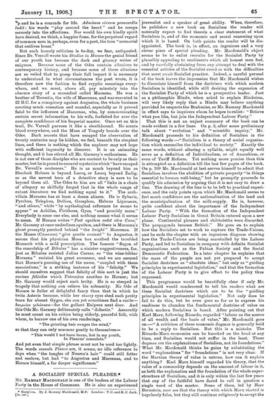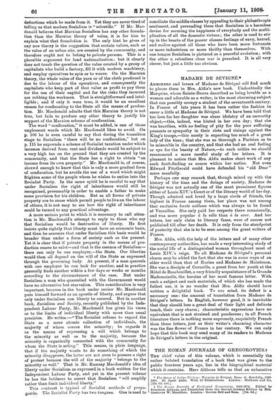A SOCIALIST SPECIAL PLEADER.*
Ma. RAMSAY MACDONALD is one of the leaders of the Labour Party in the House of Commons. He is also an experienced • Socialism. By J. Ramsay Macdonald, M.P. London : T. C. and E. C. Jack. [la. net.]
journalist and a speaker of great ability. When, therefore, he publishes a new book on Socialism the reader will naturally expect to find therein a clear statement of what Socialism is, and of the economic and moral reasoning upon which it is based. On both points the reader will be dis- appointed. The book is, in effect, an ingenious and a very clever piece of special pleading. Mr. Macdonald's object seems to be to enlist recruits for the Socialist Party by plausibly appealing to sentiments which all honest men feel, and by carefully abstaining from any attempt to deal with the essential articles of the Socialist creed or with the difficulties that must await Socialist practice. Indeed, a careful perusal of the book leaves the impression that Mr. Macdonald wishes to dissociate himself from the doctrines with which modern Socialism is identified, while still desiring the expansion of the Socialist Party of which he is a prospective leader. Just as a philosophic Hindu, when asked to explain Hinduism, will very likely reply that a Hindu may believe anything provided he respects the Brahmins, so Mr. Ramsay Macdonald in effect says to inquirers whom he hopes to enlist : "Believe what you like, but join the Independent Labour Party."
That this is not an unjust summary of the book can be made evident in a few lines. On p. 3, after some preliminary talk about " evolution " and "scientific inquiry," Mr.. Macdonald proceeds to his definition of Socialism in the following words :—" Socialism is a theory of social organisa- tion which reconciles the individual to society." Exactly the same words, without altering a syllable, might equally well serve as a definition of Individualism, or of Anarchism, or even of Tariff Reform. Yet nothing more precise than this is atteretted as a definition till the last few pages of the book. On p. 109 Mr. Macdonald at last nerves himself to admit that Socialism involves the abolition of private property "in things essential to human well-being," but he promptly proceeds to qualify his admission by arguing that it is not easy to draw a line. The drawing of the line is to be left to practical experi- ence, and the only points upon which Mr. Macdonald seems to feel much confidence are the nationalisation of the land and the municipalisation of the milk-supply. He is, however, quite confident about the importance of the Independent Labour Party. "With the formation of the Independent Labour Party Socialism in Great Britain entered upon a new phase. Continental phrases and shibboleths were discarded. The propaganda became British." He goes on to explain how the Socialists set to work to capture the Trade-Unions, and be ends the chapter with an ingenious diagram showing how the Trade-Unions are being marshalled by the Labour Party, and led to Socialism in company with definite Socialist organisations such as the Fabian Society and the Social Democratic Federation. In a later chapter he explains that the mass of the people are not yet prepared to accept Socialist doctrines as "absolute ideas," but only as "guiding principles in experimental legislation," and that the formation of the Labour Party is to give effect to the policy thus expressed.
This programme would be beautifully clear if only Mr. Macdonald would condescend to tell his readers what are these Socialist doctrines which are to be the "guiding principles in experimental legislation." Not only does he fail to do this, but he even goes so far as to express his readiness to abandon the fundamental doctrine of value on which modern Socialism is based. After pointing out that Karl Marx, following Ricardo, regarded "labour as the source of all wealth and the basis of value," Mr. Macdonald goes on :—" A criticism of these economic dogmas is generally held to be a reply to Socialism. But this is a mistake. The Ricardo-Marx economics can be knocked on the head at any time, and Socialism would not suffer in the least. These dogmas are the explanations of Socialism, not its foundations." What Mr. Macdonald thinks he gains by substituting the word " explanations " for "foundations" is not very clear. If the Marxian theory of value is untrue, how can it explain anything ? Karl Marx himself regarded his theory, that the value of a commodity depends on the amount of labour in it, as both the explanation and the foundation of the whole super- structure of Socialism, and it is only within the last few years that any of the faithful have dared to call in question a single word of the master. Some of them, led by Herr Bernstein, now see that the theory with which Marx started is hopelessly false, but they still continue religiously to accept the
deductions which he made from it. Yet they are never tired of telling us that modern Socialism is f' scientific." If Mr. Mac- donald believes that Marxian Socialism has any other founda- tion than the Mandan theory of value, it is for him to explain what that foundation is. The only hint he gives of any new theory is the suggestion that certain values, such as the value of an urban site, are created by the community, and therefore ought not to belong to private persons. This is a plausible argument for land nationalisation; but it clearly does not touch the question of the value created by a group of capitalists who build a factory, fill it with modern machinery, and employ operatives to spin or to weave. On the Mandan theory, the whole value of the yarn or of the cloth produced is due to the labour of the operatives, and consequently the capitalists who keep part of that value as profit to pay them for the use of their capital and for the risks they incurred are robbing the workmen. That is straightforward and intel- ligible; and if only it were true, it would be RR excellent reason for confiscating to the State all the means of produc- tion. Idr. Macdonald admits that this Marxian theory is not true, but fails to produce any other theory to justify his support of the Marxian scheme of confiscation. The word "confiscation," it must be added, is one of those unpleasant words which Mr. Macdonald likes to avoid. On p. 106 he is even careful to say that during the transition stage to Socialism "there will be no confiscation," but on p. 115 he expounds a scheme of Socialist taxation under which incomes derived from rent and dividends would be subject to a very high tax on the ground that they are created by the community, and that the State has a right to obtain "an income from its own property." Mr. Macdonald is, of course, shrewd enough to know that this is only a more gradual form of confiscation, but he avoids the use of a word which might frighten some of the people whom he wishes to entice into the *ocialist Party. In the same spirit he is careful to say that under Socialism the right of inheritance would still be recognised, presumably in order to enable a father to make some provision for his children. But as all forms of private property are to cease which permit people to live on the labour of others, it is not easy to see how the right of inheritance could be turned to any practical advantage. A more serious point to which it is necessary to call atten- tion is Mr. Afacdonald's attempt to reply to those who say that Socialism would be destructive of liberty. He first insists quite rightly that liberty must have an economic basis, and then he assumes that under Socialism this basis would be broader than under a form of society such as the present. Xet it is clear that if private property in the means of pro- duction ceases to exist—and that is the essence of Socialism— there can only be one employer,—the State. Our liberties would then all depend on the will of the State as expressed through the governing body. At present, if a man quarrels with one employer he can look for another, and in practice generally finds another within a few days or weeks or months according to the circumstances of the case. But under Socialism a man who quarrelled with the Government would have no alternative but starvation. This consideration is very important, because in the book under review Mr. Macdonald puts himself forward as an apostle of liberty, and argues that only under Socialism can liberty be secured. But in another book, Socialism. and Society, recently published by the Inde- pendent Labour Party, Mr. Macdonald has given his views as to the limits of individual liberty with more than usual precision. He writes :—" The Socialist refuses to regard the State as a mere atomio collection of individuals, the majority of whom coerce the minority; he regards it as the means of expressing a will which belongs to the minority as well as to the majority, because the minority is organically connected with the community for whom the State is acting." This means, in plain language, that if the majority wants to do something of which the minority disapprove, the latter are not even to possess a right of protest because the will of the majority "belongs to the minority as well." That is Mr. Ramsay Macdonald's idea of liberty under Socialism as expressed in a book written for the Independent Labour Party, and yet in the present volume he has the boldness to assert that Socialism "will amplify rather than limit individual liberty." This contrast is typical of Socialist methods of propa- ganda. The Socialist Party has two tongues. One is used to conciliate the middle classes by appealing to their philanthropio sentiment, and persuading them that Sooialism ie a harmless device for securing the happiness of everybody and the multi- plication of all the domestic virtues; the other is used to stir up in the hearts of the poorer classes feelings of envy, hatred, and malice against all those who have been more fortunate or more industrinua or more thrifty than themselves. With one tongue Socialism is pictured as a peaceful evolution; with the other a relentless class war is preached. It is all very clever, but just a little too obvious.











































 Previous page
Previous page